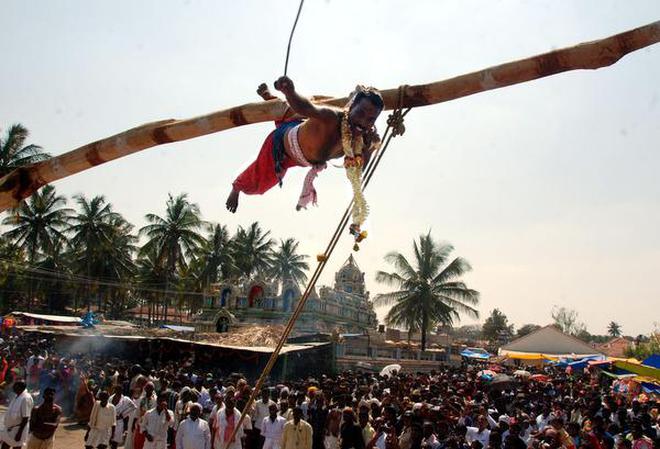It depends on interpretation! Will it stand legal scrutiny? It is a thin line that differentiates what is banned and what is not! So now menstruating women cannot be forcefully segregated!!
Karnataka anti-superstition Bill: what is banned and what is not?
Nagesh Prabhu September 27, 2017

A man performs Sidi in Hassan, a ritual involving inserting hooks on the back and suspending from a pole.
The Karnataka Cabinet on Wednesday cleared the much-delayed and debated Karnataka Prevention and Eradication of Inhuman Evil Practices and Black Magic Bill, 2017, popularly known as the anti-superstition Bill.
The Bill, if cleared by the State legislature, is expected to put an end to various inhuman practices such as black magic, witchcraft, or any act in the name of religion that causes harm to humans and animals. However, acts such as Kesh Lochan (plucking of hair), vaastu and astrology have not been barred.
Here is the list of what is banned and what is not banned:
What is not banned:
Karnataka anti-superstition Bill: what is banned and what is not?
Nagesh Prabhu September 27, 2017
A man performs Sidi in Hassan, a ritual involving inserting hooks on the back and suspending from a pole.
The Karnataka Cabinet on Wednesday cleared the much-delayed and debated Karnataka Prevention and Eradication of Inhuman Evil Practices and Black Magic Bill, 2017, popularly known as the anti-superstition Bill.
The Bill, if cleared by the State legislature, is expected to put an end to various inhuman practices such as black magic, witchcraft, or any act in the name of religion that causes harm to humans and animals. However, acts such as Kesh Lochan (plucking of hair), vaastu and astrology have not been barred.
Here is the list of what is banned and what is not banned:
What is not banned:
- The form of the worship such as Pradakshina, Yatra, Parikrama performed at religious places
Harikata, Keerthana, Pravachana, Bhajana, teaching of ancient and traditional learning and arts, practice, propagation and circulation
Miracles of the deceased saints propagation, publicity and circulation of the same and the propagation, publicity and distribution of literature about miracles of the religious preachers which do not cause physical injury
Performance of prayers, upasana and religious rituals at home, temple, darghas, gurdwara, pagoda, church, and other religious places which do not cause physical injury
All religious celebrations, festivals, prayers, procession and other act relating other rituals
Piercing of ears and nose of children in accordance with rituals and performance of religious ritual such as Kesh Lochan by the Jains
Advice in regard to vaastu shasthra, and advice by jyothishya and other astrologers
- Facilitating any person or persons roll over (uruli seve) on the leaves of left over food by other persons in any public or religious places or similar practices that violate human dignity, also known as made snana
Cercing any person to perform fire-walk at the time of jatras/religious festivals, causing physical injury
Practice of piercing from rods from one side of jaw to another side of the jaw and including the tongue (baibiga practice)
Pelting stones in the name of banamathi, mata-mantra and mata-mantra on the residential houses during night or day
Prohibiting and preventing a person from taking medical treatment in the case of dog, snake, or scorpion bite, and instead giving him ‘treatment’ like mata-mantra, gandra-dora of such other things
Forcing person to carry on evil practices such as killing of an animal by biting its neck (gaavu), that cause harm to public health nuisance
Performing any inhuman, evil act and black magic in search of precious things, bounty and hidden treasure in the name of banamathi, mata-mantra, assaulting any person, parading naked or put a ban on his daily activities or instigate advise or encourage committing such inhuman acts
To create an impression by declaring that a power inapprehensible by senses has influenced one’s body or that a person has possessed such power thereby create fear in the minds of people or to threaten others of evil consequences for not following the advice of such person or deceive defraud and deter them
Under the pretext of expelling the ghost, assaulting by tying the person with rope or chain, beating by stick or whip to make the person drink footwear soaked water, causing pain by way of touching heated object to organs or body of a person, forcing a person to perform sexual act in the open, practice inhuman acts, putting urine or human excreta forcibly in the mouth of a person or practice any such acts
Creating panic in the minds of public in general by way of invoking ghost or mantras
Preventing person taking medical treatment and diverting him or her to practice inhuman evil and aghory acts
Claiming to perform surgery by fingers or claiming to change the sex of a foetus in womb of a woman
Persuading, propagating or facilitating rituals that involve self-inflicted injuries such as hanging from a hook: inserted into the body (sidi) or pulling a chariot by hook inserted into the body
Persuading, propagating or facilitating rituals involving harm inflicted on children in the name of curing them, such as throwing them on thorns or from heights and branding them with heated objects
Practising evil practices against women by forcing isolation, prohibiting re-entry into the village or facilitating segregation of menstruating, or pregnant women; and subjecting women to inhuman and humiliating practices such as parading them naked in the name of worship, or “betthale seve”
Clarification: The Bill was earlier named the Karnataka Prevention and Eradication of Human Sacrifices and other Inhuman Evil and Aghori Practices and Black Magic Bill, 2017, it has since been renamed the Karnataka Prevention and Eradication of Inhuman Evil Practices and Black Magic Bill, 2017. The copy has been edited to reflect this.
http://www.thehindu.com/news/nation...what-is-not/article19762981.ece?homepage=true
Last edited:
